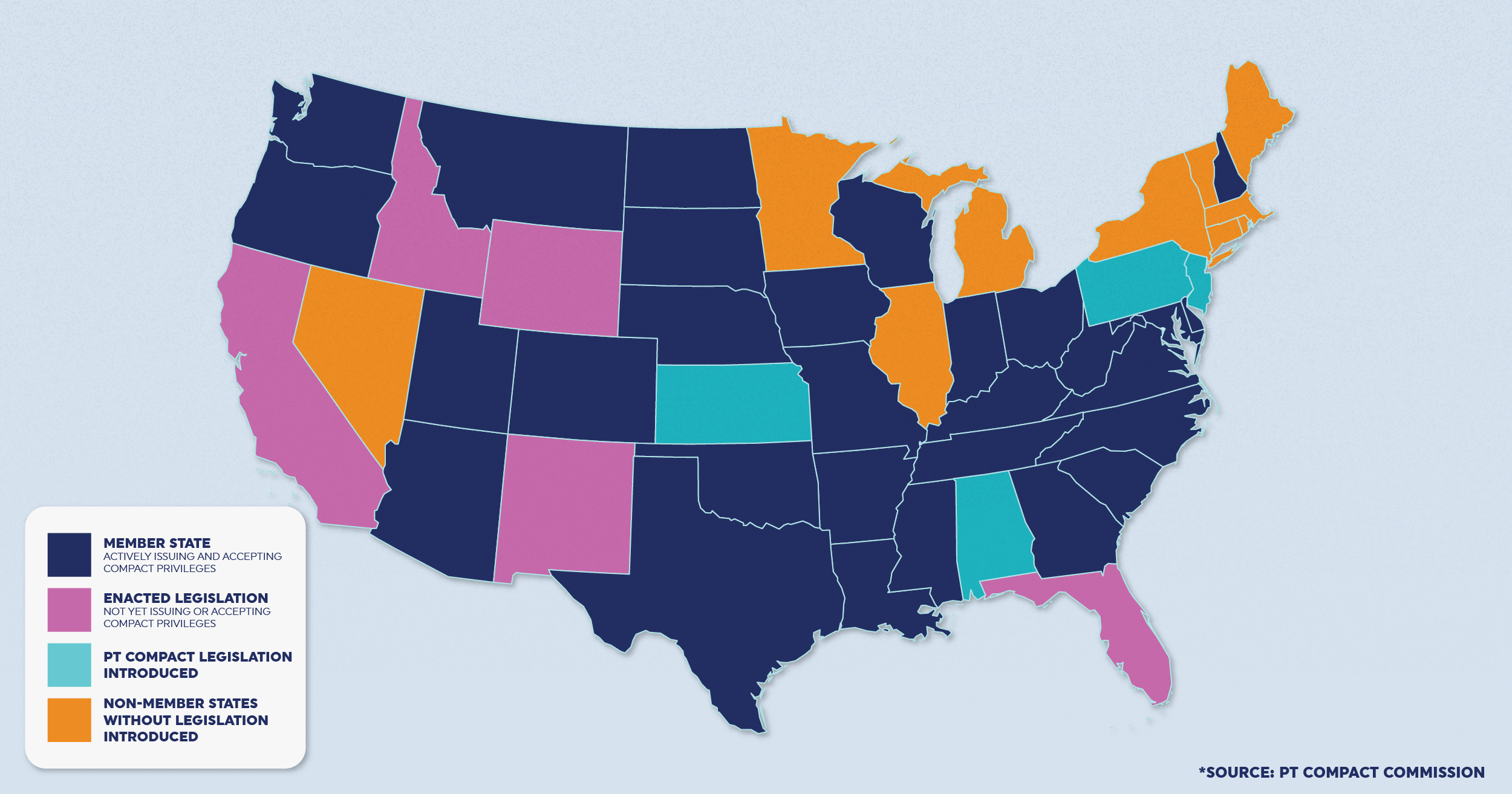
Ever thought about combining your love for adventure with your career as a physical therapist (PT) or physical therapist assistant (PTA)? Or are you a travel PT professional tired of applying for individual state licenses with every new assignment? Advance your travel physical therapy career and get a PT compact license. Here’s what you need to know.
- What is a PT compact license?
- What are the benefits of a compact PT license?
- How do I apply for a PT compact license?
- What are the PT compact license states?
PT Compact States: Advance Your Travel
Physical Therapy Career
What is a PT compact license?
It can be a pain to apply for a new state license with every travel job. That’s where the PT compact license comes in handy. The physical therapy licensure compact is a special type of healthcare license that allows PTs and PTAs to provide physical therapy services in multiple states under one license. With a PT compact license, you can kiss goodbye the days of collecting single-state PT licenses.
Currently, there are 29 member states actively issuing compact privileges while even more have introduced legislation. And that means even more travel job opportunities are on the horizon. By streamlining licensure requirements, the PT compact makes it easier and more efficient for you to practice physical therapy where you want.
What are the benefits of a compact PT license?
So, why should you get a compact PT or PTA license? One reason is that a PT compact license is a great way for you to expand your reach. With this license, physical therapy providers can enjoy increased mobility and greater flexibility when it comes to finding employment opportunities across the country. Having compact privilege also means that eligible physical therapy providers can help improve access to physical therapy services, especially for those in a remote state or where there is a shortage of providers.
Outside of the ability to work in multiple states, other benefits of getting a PT compact license include increased job security, the unique chance to grow your skills in a wide variety of healthcare settings, and the potential to save money on licensing fees. Ultimately, having a PT compact license gives opens doors to more opportunities and makes you more marketable in your field. If you’re looking to advance your travel PT career, apply for a physical therapy compact license.
Related: Want To Grow Your Career from PTA to PT? Here’s How!
How do I apply for a PT compact license?
Now that you know what the physical therapy compact is, as well as its benefits, it’s time to find out how you can apply for one. Thankfully, the steps are simple for obtaining compact privileges but may require some time and preparation. This is what you need to do to apply for a compact PT license through the physical therapy compact commission, or the Federation of State Boards of Physical Therapy (FSBPT).
1. Determine your eligibility
The first step toward gaining PT compact privileges is determining your eligibility. All physical therapists and physical therapy assistants who live in a compact member state can apply for a PT compact license. Additionally, you must also meet the following criteria:
✅ Hold a valid PT or PTA license in your home state
✅ Have a valid driver’s license in your home state
✅ No active encumbrances or disciplinary action against your license within two years
Once these boxes are checked, you’ll be on to your next step in the application process — the jurisprudence (JP) exam.
2. Pass the JP exam, if applicable
The JP exam is a comprehensive assessment of your knowledge and understanding of physical therapy regulations and guidelines. This test consists of multiple-choice questions that test a variety of topics like medical ethics, risk management, legal responsibilities, and professional boundaries.
The thing about the JP exam is it’s not required by all states, but it’s preferred by most. Plus, taking the JP exam can provide other benefits that could lead to improved job prospects or other career advancement opportunities.
3. Submit your application
You’ve passed the JP exam — now what? Now it’s time to submit your licensure application for interstate compacts. Venture over to the PT Compact website and enter your FSBPT ID and password (hint: this is the same information you used to register for the National Physical Therapy Exam or NPTE).
If it’s your first time applying for a physical therapy compact license, click the “Purchase” button and follow the steps to verify your eligibility. To make the process as efficient as possible, have a copy of your driver’s license uploaded and ready to submit. Then, pick the state(s) you want compact privileges in, confirm you’ve passed the jurisprudence exam, and purchase a compact privilege by paying the required fees.
Voila! Just like that, you’ve received your PT compact license. Instead of receiving a paper certificate, you can use your assigned unique compact privilege number(s) to start practicing your physical therapy skills in multiple states.
What are the PT compact license states?

PT compact states
*indicates if the state requires PTs and PTAs to take the JP exam
🌏 Alabama (law passed and awaiting implementation)
🌏 Georgia*
🌏 Kansas (law passed and awaiting implementation)
🌏 New Jersey (law passed and awaiting implementation)
🌏 Pennsylvania (law passed and awaiting implementation)
Noncompact states
🌏 Wyoming
Frequently asked questions
Are there any limitations or restrictions on the types of physical therapy services that can be provided under a PT compact license?
The physical therapy compact (PT Compact) allows physical therapists and physical therapist assistants to practice in multiple states under a compact license. The compact is an agreement among participating states to recognize each other's licenses.
The specific limitations or restrictions on the types of physical therapy services that can be provided under a PT compact license may vary slightly from state to state, as each state has its own licensing laws and regulations. It's essential to check the specific rules and regulations of the states involved in the compact agreement.
In general, PTs and PTAs practicing under a compact license are expected to adhere to the laws and regulations of the state in which the patient is located. They must also comply with the practice act and rules of the state where they are physically providing services.
What is the process for renewing or maintaining a PT compact license once it has been obtained?
Maintaining and renewing a PT compact license involves understanding and adhering to the requirements set by the state licensing boards of the participating states. Key steps include familiarizing oneself with the renewal requirements, submitting the renewal application before the expiration date, completing any required continuing education, paying the renewal fees, and complying with state laws and regulations.
Additionally, healthcare professionals should be aware of the need for background checks or jurisprudence exams in certain states. Promptly notifying licensing boards of any changes and staying informed about specific state processes is crucial for a seamless renewal experience. It is recommended to consult the relevant state licensing boards for the most accurate and up-to-date information on the renewal process.
How do the licensing fees for a PT compact license compare to the cumulative fees of obtaining individual state licenses for each assignment?
The PT Compact generally involves a one-time application fee and periodic renewal fees. The initial application fee may vary, and renewal fees are typically paid every one or two years. The specific amounts depend on the state.
Obtaining individual state licenses for each assignment involves application fees, renewal fees, and any additional fees required by each state. These fees can vary widely among states. Some states may have lower fees, while others may have higher costs. The total cost of individual state licenses depends on the number of states where you practice. If you work in multiple states, the cumulative fees for obtaining individual licenses for each state can add up quickly.
You should also consider the renewal cycles of each state. Some states may require annual renewals, while others may have biennial renewal cycles. The frequency of renewals can impact the overall cost. Some states may have additional requirements, such as jurisprudence exams, background checks, or fingerprinting, which may involve additional costs.
Take your physical therapy career to the next level with a PT compact license. Not only does it open opportunities for working across multiple participating states, but it also provides greater versatility and autonomy with the freedom to practice — without having to transfer licenses each time you take on a new assignment.
Whether you’re just starting out as a PT or PTA or are a seasoned expert, obtaining a physical therapy compact license can help advance your PT career. Travel physical therapists and physical therapist assistants can take their career even further and start traveling with Fusion Medical Staffing! Search for travel physical therapy and physical therapist assistant jobs and begin your travel journey.





